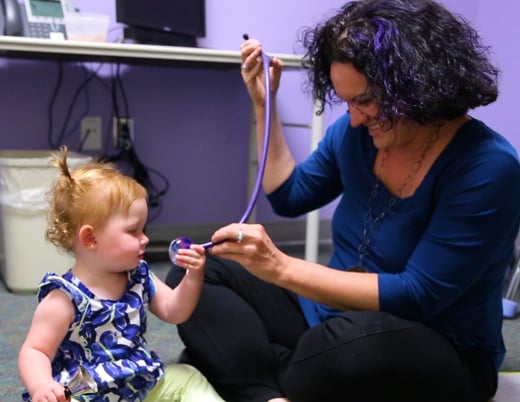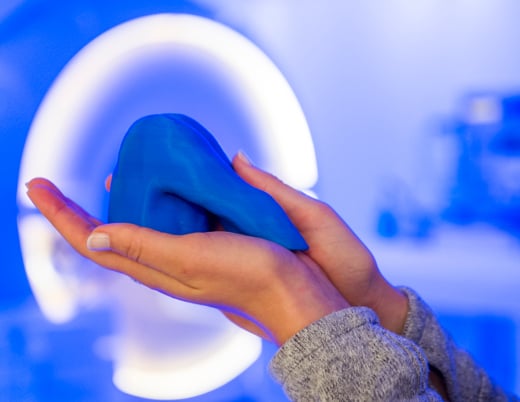How can genetic testing advance treatment for a mother and baby with a rare abnormality?
Katie Gleeson was searching for clues. At 10 weeks pregnant, she turned to genetic testing in hopes of learning more about herself, her unborn child and the fetus she’d previously lost. That glimpse into her genes revealed answers that were greater — and more urgent — than she ever could’ve predicted.
Detecting genetic anomalies early
Gleeson’s journey in precision medicine began at UCHealth where she met with Manesha Putra, MD, a maternal fetal medicine physician specializing in prenatal genetics and genomics. Dr. Putra confirmed that Gleeson carried a MAGED2 gene variation, which is associated with Bartter syndrome, a rare pregnancy complication that affects a fetus' kidney function. With two patients facing a potentially life-threatening condition, Dr. Putra referred Gleeson to Colorado Fetal Care Center maternal fetal medicine specialist, Nicholas Behrendt, MD.
“Bartter syndrome is an abnormality that causes the fetus to produce a massive amount of urine, which leads to a massive amount of amniotic fluid — a condition called polyhydramnios,” Dr. Behrendt explains. “Polyhydramnios can lead to significant complications, the biggest one being premature birth.”
Premature birth can result in long-term consequences for the newborn, and if they’re born extremely early, the newborn may not be able to survive.
Gleeson's genetic testing also revealed a gene variation that can cause heart complications, such as cardiomyopathy, a disease of the heart muscle. Although the patient’s heart was healthy at the time, her care team knew that pregnancy, as well as labor and delivery, could strain the body and cause such genetic predispositions to manifest.
Despite these potential obstacles, Gleeson’s genetic anomalies were detected early in her pregnancy, meaning Drs. Putra and Behrendt were in a unique position to create a personalized care plan that would keep both her and her baby healthy.
Navigating amnioreduction in a complex pregnancy
The first step in Gleeson’s care was keeping her polyhydramnios at bay through the amnioreduction process.
“An amnioreduction entails putting a needle in and draining amniotic fluid several times over the course of the pregnancy to keep pressure off the uterus and prevent the patient from delivering early,” Dr. Behrendt says. “We don’t currently have a way to treat the genetic variant that causes Bartter syndrome inside the womb, so we had to focus on treating the polyhydramnios, the complication of her variant.”
While the procedure is relatively common, Dr. Behrendt suspected that Bartter syndrome caused Gleeson to lose a previous pregnancy, increasing the importance of well-timed reductions. Additionally, given the patient’s condition, Dr. Behrendt knew he’d have to drain the fluid several times.
“The challenge of an amnioreduction is entering the amniotic sac safely, removing that fluid and minimizing complications, such as breaking the water, going into labor or causing bleeding,” Dr. Behrendt adds.
To minimize such hurdles, Dr. Behrendt monitored Gleeson closely, ultimately performing more than 30 ultrasounds.
“The minute we started to see her amniotic fluid increase, we wanted to be quick to perform an amnioreduction in order to minimize complications from polyhydramnios,” Dr. Behrendt says. “We did her first amnioreduction in the low 20-week range, which is pretty early compared to when we usually do a procedure like that.”
Dr. Behrendt removed multiple liters of amniotic fluid during each of Gleeson’s three amnioreductions, which helped minimize the number of procedures needed.
Leveraging precision medicine for high-risk pregnancies and neonatal care
Gleeson’s early genetic diagnosis allowed a multidisciplinary team to leverage precision medicine in her care plan, meaning her treatment was personalized to her specific genes. A team of experts from the Colorado Fetal Care Center, nephrology, neonatology and genetics had time to monitor her and the baby and prepare for the birth.
“When a baby is born with this genetic difference, you need nephrologists and neonatologists and caregivers that can manage a baby who has a different fluid balance, and anything else unexpected,” Dr. Behrendt explains.
Due to the cardiomyopathy gene detected in Gleeson’s tests, her care team determined it would be best for her to deliver at UCHealth hospital, where experts could safely monitor her heart while also watching her baby, whom she decided to name Henry. Next door at Children’s Colorado, additional experts — such as nephrologist Margaret Bock, MD — were available to care for Henry after birth.
Fortunately, both Gleeson and Henry remained healthy throughout the birth, and Henry’s kidney condition resolved on its own once he was born.
“Not too long ago, we wouldn’t have had the ability to make this diagnosis for Katie’s baby,” Dr. Behrendt says. “We had an incredibly different outcome in this pregnancy than her prior one.”
Detecting this condition early also made Gleeson one of just a handful of people worldwide to carry a child with Bartter syndrome to full term.
“Genetic testing helps us anticipate care, anticipate procedures and anticipate expected outcomes. Knowledge is power in these situations,” Dr. Behrendt says. “Our ability to diagnose a wide breadth of differences, mutations and diseases makes us smarter, better caregivers in the world of fetal medicine.”
Featured Researchers
Nicholas Behrendt, MD
Maternal fetal medicine specialist
Children’s Hospital Colorado
Associate professor
Ob/Gyn-Maternal Fetal Medicine
University of Colorado School of Medicine

Manesha Putra, MD
Maternal fetal medicine specialist
Children’s Hospital Colorado
Assistant professor
Ob/Gyn-Maternal Fetal Medicine
University of Colorado School of Medicine





 720-777-0123
720-777-0123










